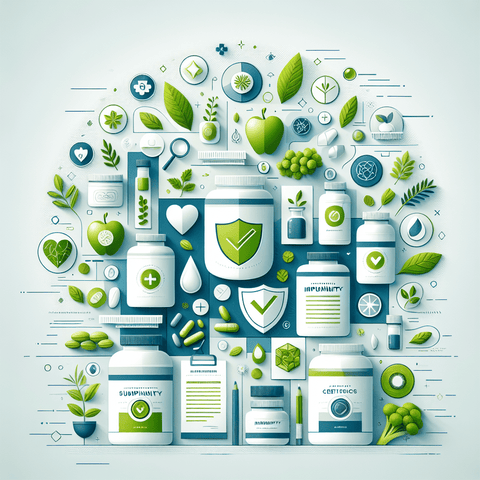Unlocking the Secrets of Third-Party Tested Supplements for Safer, Higher-Quality Nutrition
In today’s fast-paced world, the pursuit of optimal health has turned more than ever towards nutritional supplements. Whether you aim to boost your immune defense, enhance mental clarity, support your bones, or improve overall wellness, choosing high-quality supplements is paramount. However, the supplement industry is vast and often lacks consistent regulation, leading to concerns about product safety, authenticity, and efficacy. As consumers become increasingly vigilant, the demand for transparency and scientifically validated quality assurance methods has surged. Among these methods, third-party testing stands out as a critical pillar in ensuring that the supplements you consume are both safe and true to their label claims. This comprehensive guide explores the core principles, processes, and benefits of third-party tested supplements, and provides practical tips to help you make informed, confident choices for your health.
Third-Party Tested Supplements: The Foundation of Trust in Nutrition
First and foremost, understanding what third-party testing entails is essential. The supplement industry is characterized by a multitude of manufacturers, each with varying quality standards and quality control measures. While some companies maintain rigorous internal testing protocols, others may prioritize cost-cutting, resulting in potential discrepancies between label claims and actual product contents. Third-party testing refers to independent assessment conducted by external organizations not affiliated with the supplement manufacturer. These independent entities evaluate various aspects of a product to verify that it meets quality, safety, and potency standards. Key organizations involved in third-party testing include NSF International, USP (United States Pharmacopeia), and Non-GMO Project, among others.
The importance of third-party testing cannot be overstated. It provides an added layer of credibility and safety, ensuring consumers that what is on the label matches what’s inside the capsule or powder. Benefits for consumers are numerous: increased confidence in product purity, assurance of ingredient potency, and reduced risk of contaminants such as heavy metals, pesticides, or microbial pathogens. Some misconceptions about supplement quality persist—many believe that all supplements are thoroughly tested or that manufacturer claims are inherently trustworthy. Third-party testing dispels these myths by offering objective validation, helping consumers avoid products with misleading labels or harmful contaminants.
Nutritional Supplement Certification: Validating Quality and Authenticity
Certification from recognized organizations adds credibility to supplement products. Certifications like NSF Certified for Sport, USP Verified, and Good Manufacturing Practice (GMP) compliance signals a commitment to quality and safety. Each certification involves a thorough review process, including testing for purity, potency, manufacturing practices, and labeling accuracy. For example, NSF certification requires an audit of manufacturing facilities, verification of ingredient identity and concentration, and confirmation of contaminant levels within safe thresholds.
When selecting supplements, consumers should look for certification logos prominently displayed on packaging. Such credentials ensure that the product has undergone rigorous external review and meets strict quality parameters. However, it's important to recognize the limitations of certifications. They typically validate certain aspects like cleanliness and potency but do not guarantee the efficacy of specific health claims. Therefore, certifications should be viewed as part of a broader trust framework that also includes transparent sourcing, detailed labeling, and independent testing results.
Independent Supplement Testing: Ensuring Transparency and Objectivity
Independent laboratories play a crucial role in providing unbiased analysis of supplements. These laboratories conduct comprehensive tests that include screening for contaminants like heavy metals, microbial contamination, pesticides, solvent residues, and allergens. They also verify ingredient purity and quantify active compounds to confirm label accuracy. For example, if a fish oil supplement claims to contain specific levels of DHA and EPA, independent lab testing can verify these claims with scientific precision.
Real-world cases have demonstrated the importance of independent testing. In some instances, products labeled as “high-potency” or “contaminant-free” have been found to contain undisclosed substances or levels of pollutants exceeding safety thresholds. Such findings highlight why reliance solely on manufacturer claims can be risky. Independent testing provides consumers with an objective, scientifically grounded assessment, ensuring that supplements are authentic, safe, and effective. This approach fosters transparency, promotes higher industry standards, and encourages manufacturers to adhere to strict quality controls.
Validated Supplement Quality: Evidence-Based Assurance
The term “validated” in the context of supplements refers to products that have undergone multiple layers of scientific and regulatory scrutiny. Validation involves peer-reviewed studies, laboratory analyses, and adherence to industry standards. When a supplement’s quality is validated, it signifies that independent experts have confirmed the product contains the specified ingredients at the claimed dosages, free from harmful contaminants, and produced under conditions meeting strict quality standards.
Scientific validation might include studies indicating bioavailability or efficacy, which support the supplement’s health claims. For consumers, choosing validated products translates to greater assurance of safety and potential health benefits. Moreover, validated supplements often undergo stability testing to ensure their potency over product shelf life, further supporting consistent, reliable nutrition.
Third-Party Verification Processes: Building Consumer Confidence
The verification process begins with the supplement manufacturer submitting their product samples and manufacturing documentation to a third-party organization. These organizations conduct random audits, batch testing, and review of manufacturing practices, raw material sourcing, and testing protocols. Upon successful review, the product receives verification or certification status, which is then reflected on labeling and packaging, often via official logos or seals.
An ongoing verification process is key to maintaining trust. Many third-party agencies conduct periodic re-evaluations and even surprise audits to ensure continued compliance. As safety concerns evolve, verification standards are periodically updated to incorporate new scientific insights and safety data. This dynamic process ensures that consumers can rely on brands adhering to the highest possible quality benchmarks—not just at the time of initial approval, but throughout the product lifecycle.
Supplement Safety Standards: Protecting Consumers from Risks
Ensuring supplement safety involves adherence to various safety standards established by regulatory bodies and industry groups. Critical safety parameters include ingredient safety, contaminant thresholds (e.g., heavy metals, microbial limits), and precise dosage accuracy. Regulatory agencies such as the FDA (Food and Drug Administration) and EFSA (European Food Safety Authority) provide guidelines, but since supplements are categorized as food products, their regulation can be less stringent than pharmaceuticals.
Ongoing safety monitoring involves post-market surveillance, consumer feedback, and re-testing of products, especially for contaminants. Effective safety standards mean products are free from hazardous substances, contain accurate ingredient amounts, and do not pose health risks when used as directed. By choosing supplements that meet established safety standards and have third-party verification, consumers can significantly reduce the risk of adverse effects and ensure that their nutritional intake is both safe and effective.
Practical Tips for Choosing Third-Party Tested Supplements
To optimize your supplement choices, it is essential to recognize credible third-party logos and certifications—look for seals from organizations like NSF, USP, or Non-GMO Project. These marks indicate that the product has been independently evaluated. Always examine the label for test batch numbers or certificates of analysis (COAs), which provide detailed testing results. Ask retailers or manufacturers about the testing procedures and request transparent documentation.
Transparency is vital. If a product claims to contain specific ingredients like [Vitamin D](https://www.topvitamine.com/collections/vitamin-d-benefits-sources-safety), [Vitamin C](https://www.topvitamine.com/collections/vitamin-c-benefits-immunity-antioxidant-energy), or [Magnesium](https://www.topvitamine.com/collections/magnesium-benefits-energy-muscle-bone-support), verify that these claims are supported by independent testing. Utilizing reputable resources and tools for verification can further enhance your confidence. Knowledge is empowerment: the more you educate yourself on supplement labels, third-party logos, and testing reports, the safer and more effective your supplement regimen will be.
Conclusion
In an industry where quality variability exists, third-party testing and verification emerge as essential safeguards for consumers seeking safe, high-quality nutritional supplements. These processes ensure that products are authentic, free from harmful contaminants, and accurately labeled, thus supporting your health goals with integrity and transparency. By prioritizing supplements with independent validation, consumers not only protect themselves but also encourage higher industry standards and more responsible manufacturing practices. Making informed choices based on scientifically validated quality assurance is the key to safer, more effective supplementation and ultimately, to achieving optimal health.
Q&A Section
Q: Why is third-party testing important when selecting nutritional supplements?
A: Third-party testing provides an unbiased assessment of supplement purity, potency, and safety, ensuring that products meet label claims and are free from harmful contaminants. This independent validation helps consumers make informed, confident choices for their health.
Q: What are some reputable third-party organizations for supplement verification?
A: Well-known organizations include NSF International, USP (United States Pharmacopeia), and the Non-GMO Project. Look for their logos on product packaging for verified quality and safety standards.
Q: Can certifications guarantee the efficacy of a supplement’s health claims?
A: Certifications primarily verify purity, safety, and manufacturing practices. They do not necessarily confirm the efficacy of health claims, which require scientific evidence. Always consult scientific studies and reviews for efficacy information.
Q: How can I verify the safety of a supplement before purchase?
A: Check for third-party certification logos, request Certificate of Analysis (COA), review lab testing results, and purchase from reputable brands known for transparency and quality standards.
Q: What should I do if I find a product failed third-party testing?
A: Avoid using the product and report your findings to relevant regulatory agencies or testing organizations. Consider choosing brands that adhere to strict safety standards and provide transparent testing documentation.
Important Keywords
- Third-party tested supplements
- Supplement certification
- Independent testing
- Supplement safety standards
- Validated supplement quality
- Safe nutritional supplements
- Supplement verification process
- Contaminant testing
- Quality assurance in supplements
- Supplement industry transparency



